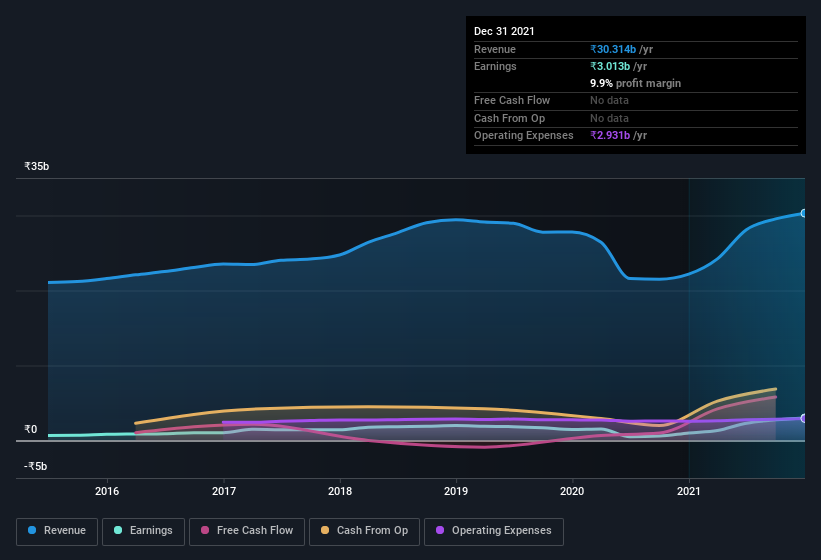- India
- /
- Auto Components
- /
- NSEI:ASAHIINDIA
Here's Why I Think Asahi India Glass (NSE:ASAHIINDIA) Might Deserve Your Attention Today

For beginners, it can seem like a good idea (and an exciting prospect) to buy a company that tells a good story to investors, even if it completely lacks a track record of revenue and profit. But the reality is that when a company loses money each year, for long enough, its investors will usually take their share of those losses.
In the age of tech-stock blue-sky investing, my choice may seem old fashioned; I still prefer profitable companies like Asahi India Glass (NSE:ASAHIINDIA). Even if the shares are fully valued today, most capitalists would recognize its profits as the demonstration of steady value generation. Conversely, a loss-making company is yet to prove itself with profit, and eventually the sweet milk of external capital may run sour.
Check out our latest analysis for Asahi India Glass
How Quickly Is Asahi India Glass Increasing Earnings Per Share?
As one of my mentors once told me, share price follows earnings per share (EPS). That means EPS growth is considered a real positive by most successful long-term investors. We can see that in the last three years Asahi India Glass grew its EPS by 15% per year. That's a pretty good rate, if the company can sustain it.
One way to double-check a company's growth is to look at how its revenue, and earnings before interest and tax (EBIT) margins are changing. The good news is that Asahi India Glass is growing revenues, and EBIT margins improved by 6.8 percentage points to 18%, over the last year. Ticking those two boxes is a good sign of growth, in my book.
The chart below shows how the company's bottom and top lines have progressed over time. To see the actual numbers, click on the chart.

While profitability drives the upside, prudent investors always check the balance sheet, too.
Are Asahi India Glass Insiders Aligned With All Shareholders?
I like company leaders to have some skin in the game, so to speak, because it increases alignment of incentives between the people running the business, and its true owners. As a result, I'm encouraged by the fact that insiders own Asahi India Glass shares worth a considerable sum. Notably, they have an enormous stake in the company, worth ₹19b. That equates to 19% of the company, making insiders powerful and aligned with other shareholders. Very encouraging.
It means a lot to see insiders invested in the business, but I find myself wondering if remuneration policies are shareholder friendly. Well, based on the CEO pay, I'd say they are indeed. I discovered that the median total compensation for the CEOs of companies like Asahi India Glass with market caps between ₹77b and ₹248b is about ₹38m.
Asahi India Glass offered total compensation worth ₹33m to its CEO in the year to . That seems pretty reasonable, especially given its below the median for similar sized companies. CEO remuneration levels are not the most important metric for investors, but when the pay is modest, that does support enhanced alignment between the CEO and the ordinary shareholders. It can also be a sign of a culture of integrity, in a broader sense.
Is Asahi India Glass Worth Keeping An Eye On?
One positive for Asahi India Glass is that it is growing EPS. That's nice to see. Earnings growth might be the main game for Asahi India Glass, but the fun does not stop there. Boasting both modest CEO pay and considerable insider ownership, I'd argue this one is worthy of the watchlist, at least. It is worth noting though that we have found 2 warning signs for Asahi India Glass that you need to take into consideration.
Of course, you can do well (sometimes) buying stocks that are not growing earnings and do not have insiders buying shares. But as a growth investor I always like to check out companies that do have those features. You can access a free list of them here.
Please note the insider transactions discussed in this article refer to reportable transactions in the relevant jurisdiction.
New: Manage All Your Stock Portfolios in One Place
We've created the ultimate portfolio companion for stock investors, and it's free.
• Connect an unlimited number of Portfolios and see your total in one currency
• Be alerted to new Warning Signs or Risks via email or mobile
• Track the Fair Value of your stocks
Have feedback on this article? Concerned about the content? Get in touch with us directly. Alternatively, email editorial-team (at) simplywallst.com.
This article by Simply Wall St is general in nature. We provide commentary based on historical data and analyst forecasts only using an unbiased methodology and our articles are not intended to be financial advice. It does not constitute a recommendation to buy or sell any stock, and does not take account of your objectives, or your financial situation. We aim to bring you long-term focused analysis driven by fundamental data. Note that our analysis may not factor in the latest price-sensitive company announcements or qualitative material. Simply Wall St has no position in any stocks mentioned.
About NSEI:ASAHIINDIA
Asahi India Glass
An integrated glass and windows solutions company, manufactures and supplies various glass products in India and internationally.
Reasonable growth potential with adequate balance sheet.
Similar Companies
Market Insights
Community Narratives




